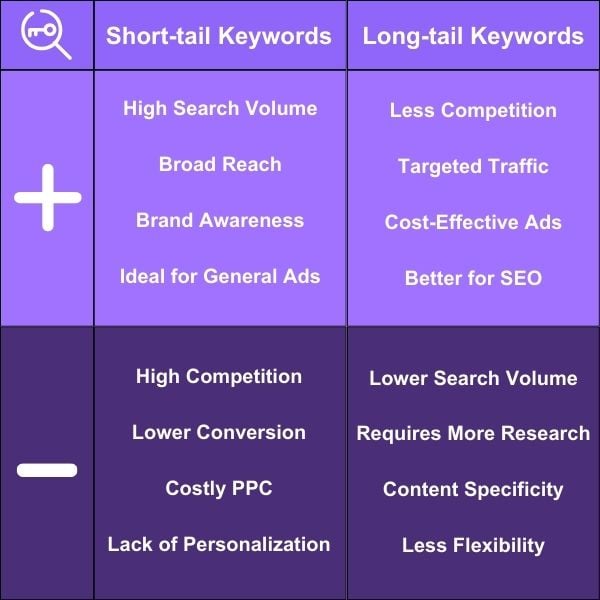This article offers a comprehensive exploration of keyword research and targeting, highlighting its pivotal role in the world of SEO.
Content
The Importance of Keyword Research
Tools and Techniques for Keyword Research
Voice and Visual Search in SEO Keyword Targeting
Introduction
The majority of our interactions with businesses and content begin with a simple online search. Whether we're looking for the best Thai restaurant nearby, a guide to mend a broken faucet, or a review on the latest smartphone, search engines serve as our gateways to information. At the heart of this online search experience lies Search Engine Optimization (SEO) and, more specifically, keywords.
What is SEO?
Search Engine Optimization (SEO) is the art and science of optimizing online content, so it appears higher on search engine results pages (SERPs). In simpler terms, it's a set of strategies that website owners use to increase their site's visibility for relevant searches. The goal is to attract organic (non-paid) traffic to a website by ensuring that it appears prominently on search engines like Google, Bing, and Yahoo.
Why Are Keywords Important?
Imagine keywords as the bridges that connect potential users' queries to the content they're searching for. When a user types a search query, search engines sift through vast amounts of data to provide the most relevant results. Keywords serve as markers, guiding search engines towards content that best answers a user's query.
The Importance of Keyword Research
1. A Bridge Between Content Creators and Users
Every day, billions of searches are made across search engines. Each search is an expression of people's needs, desires, questions, or interests. By conducting keyword research, content creators can gain insight into these needs, ensuring their content is tailored to address specific queries. It's not just about driving traffic; it's about driving relevant traffic.
2. Improved Search Engine Rankings
Search engines, especially Google, place significant emphasis on delivering relevant, quality content to its users. When you optimize your content with the right keywords, it sends a signal to search engines about the relevancy of your content to specific queries.
3. Insight into Market Trends
Keyword research doesn't just inform you about what users are searching for; it provides a lens into the market dynamics. For instance, a sudden spike in searches related to "home workouts" could indicate a rising trend in home-based fitness.
4. Efficient Use of Resources
In the world of online content, not all topics are created equal. Keyword research enables content creators and marketers to prioritize topics and themes that are more likely to resonate with their target audience, ensuring resources—time, money, and effort—are used effectively.
5. Higher Conversion Rates
Relevance is key to conversions. When users find exactly what they're looking for on your website, be it information or products, they are more likely to take desired actions, such as signing up, making a purchase, or sharing the content. By targeting the right keywords, you increase the likelihood of attracting users who are further down the sales funnel and closer to making a decision.
6. Keeping Up with Evolving User Behavior
As new technologies emerge, platforms evolve, and user behaviors shift, the way people search online also changes. Regular keyword research ensures that you remain updated with the latest trends, colloquialisms, and phrases that users employ in their searches.
7. Formulating a Content Strategy
Keyword research isn't just about identifying individual keywords. It also reveals clusters of topics and themes that your target audience is interested in. This can be invaluable when planning a content calendar or formulating a broader content strategy.
Understanding the Basics
Grasping keyword research requires a foundational understanding of certain key concepts. These essential building blocks will provide a roadmap for our exploration into deeper keyword research waters.
Short-tail keywords
- Typically one to two words.
- General and broad. For instance: "shoes" or "laptops."
- High search volume but also high competition.
Long-tail keywords
- Usually three or more words.
- More specific and often niche-focused. Examples include "women's red leather boots" or "best gaming laptops under $1000."
- Lower search volume compared to short-tail keywords but often have a higher conversion rate due to their specificity.

While short-tail keywords can bring in vast amounts of traffic, it's the long-tail keywords that often provide more value, especially for newer websites or those in competitive industries.
Search Intent
Behind every search query is an intention, a problem to solve or a question to answer. Recognizing this intent is pivotal for keyword research.
- Informational: When users are looking for information or answers. E.g., "How does photosynthesis work?"
- Navigational: Searches aiming to navigate to a specific website or page. E.g., "Forecom website."
- Transactional: These involve a purchase intention. E.g., "Buy iPhone 12 online."
- Commercial Investigation: Users looking to compare products or services before making a decision. E.g., "iPhone vs. Samsung camera comparison."
It's vital to ensure that the content aligns with the user's search intent. For instance, if someone is in the transactional phase, having a page geared towards product comparison might not be as effective as showcasing product features and providing a purchase link.
Tools and Techniques for Keyword Research
Free Tools
Even on a budget, there are several potent tools at your disposal:
Google Keyword Planner:
- A free offering from Google Ads, this tool provides insights into search volumes, competition levels, and even offers keyword suggestions.
- Technique: Use it to identify seasonal trends in keyword search volume to align content creation with times of high interest.
Google Trends
- Allows you to see the popularity of search queries over time.
- Technique: Compare multiple keywords to identify which terms are gaining traction and which are waning. This can guide content refreshes or new topic exploration.
Ubersuggest
- This tool offers keyword suggestions, search volume data, and more.
- Technique: Dive into the “Keyword Ideas” section to uncover long-tail variations of your primary keyword.
Paid Tools
Investing in premium tools can provide more in-depth insights and streamline the research process:
Ahrefs
- A comprehensive SEO tool, Ahrefs' keyword explorer offers detailed keyword metrics, including keyword difficulty and search volume.
- Technique: Utilize the "Questions" feature to find interrogative search queries related to your topic. These can be valuable for FAQ sections or detailed guide structures.
SEMrush
- Besides its keyword research capabilities, SEMrush offers insights into your competitors' keywords, ad strategy, and more.
- Technique: Use the “Keyword Magic Tool” to generate extensive lists of keyword variations and sort by search volume or difficulty.
Moz Pro
- Another multifaceted SEO tool, its keyword explorer tool provides search volume data, keyword suggestions, and competitive metrics.
- Technique: Leverage the "SERP Analysis" feature to gauge the top-ranking pages for your desired keyword. Understand their strengths to refine your content strategy.
Voice and Visual Search in SEO Keyword Targeting
The digital search landscape is undergoing a transformative shift, moving from traditional text inputs to innovative methods such as voice and visual searches. As these methods gain momentum, understanding and adjusting our keyword research and targeting tactics for SEO becomes paramount.
Voice Search: The Rise of Conversational Queries
With the advent of digital assistants like Amazon's Alexa, Google Home, and Apple's Siri, voice search is ushering in a new era of information retrieval. Voice search queries tend to be longer, more conversational, and frequently start with question words like "Who," "What," "Where," "When," or "How." To optimize for voice search, it's beneficial to:
- Prioritize long-tail keywords that mirror the natural language used in voice queries.
- Create content in a question-answer format, mimicking the interactive nature of voice commands.
- Emphasize local SEO, as many voice searches have a local intent, often using phrases like "near me" or mentioning specific locales.
Visual Search: A Picture's Worth a Thousand Words
Innovative tools like Google Lens and Pinterest's visual search feature allow users to initiate searches using images. This approach is transformative, particularly for sectors like fashion, interior design, and retail. Visual search engines can discern objects within images and comprehend their surrounding context, often without relying heavily on text. To make the most of visual search:
- Every image on your website should be accompanied by descriptive alt text, facilitating search engines in discerning the content and context of images.
- Prioritize high-quality, clear images, as these are more readily recognized by visual search algorithms.
- Name image files descriptively, avoiding generic names in favor of context-rich ones, such as "black-leather-boots.jpg" instead of generic labels like "IMG_001.jpg."
Blending Voice and Visual into Your SEO Strategy
Understanding that the user intent behind voice and visual searches can be distinct from traditional text searches is crucial. By molding your content to suit these distinct intents, you stand a better chance at ranking higher. Integrating structured data, like schema markup, will also prove advantageous, providing search engines with clearer context, especially vital for non-textual searches. Given the rapid evolution of these technologies, staying updated with the latest in voice and visual search trends is essential.
Conclusion
Keyword research and targeting play a pivotal role in connecting content with its desired audience. The world of online search is changing, with newer methods like voice and visual search illustrating the dynamic shifts in how users seek information.
Adaptation and continuous learning stand at the heart of SEO. It's not just about visibility, but relevance, insight, and timeliness. Embracing these principles ensures that our content is not only accessible but also resonates with its audience.
Do you need help with keyword analysis? Our seasoned SEO team specializes in strategic keyword targeting to maximize your online visibility. With hands-on expertise in the latest tools and techniques, we're committed to understanding and addressing your specific SEO challenges. Feel free to contact us and let's navigate the complexities of SEO together.
FAQ
1. What is keyword research?
It's the process of identifying words or phrases users enter into search engines to optimize content visibility.
2. Why is keyword targeting crucial for SEO?
It ensures content matches user intent, improving ranking, traffic, and potential conversions.
3. What are long-tail keywords?
They're specific keyword phrases, often longer, leading to higher conversion rates due to their precise nature.
4. How do voice and visual searches impact keyword research?
Voice searches are conversational, while visual searches require image optimization for discoverability.
5. Which tools can assist in keyword research?
Tools like Google Keyword Planner, SEMrush, and Ahrefs provide keyword insights.
6. How often should I conduct keyword research?
Revisit periodically, especially when updating content or adapting to industry changes.
Topics: SEO


















